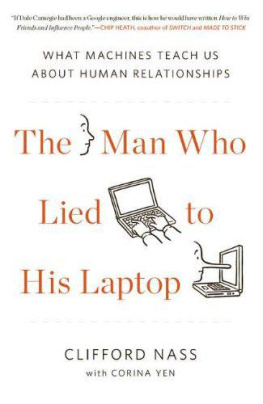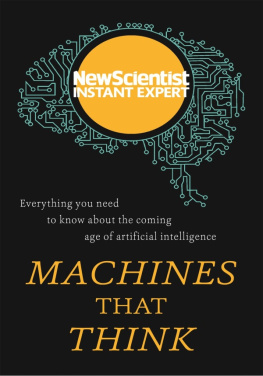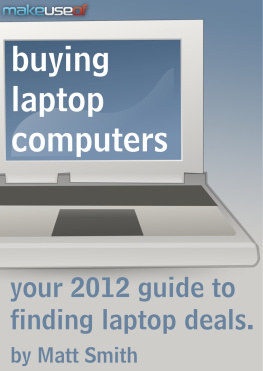Clifford Nass - The Man Who Lied to His Laptop: What Machines Teach Us About Human Relationships
Here you can read online Clifford Nass - The Man Who Lied to His Laptop: What Machines Teach Us About Human Relationships full text of the book (entire story) in english for free. Download pdf and epub, get meaning, cover and reviews about this ebook. year: 2010, publisher: Current Hardcover, genre: Science. Description of the work, (preface) as well as reviews are available. Best literature library LitArk.com created for fans of good reading and offers a wide selection of genres:
Romance novel
Science fiction
Adventure
Detective
Science
History
Home and family
Prose
Art
Politics
Computer
Non-fiction
Religion
Business
Children
Humor
Choose a favorite category and find really read worthwhile books. Enjoy immersion in the world of imagination, feel the emotions of the characters or learn something new for yourself, make an fascinating discovery.
- Book:The Man Who Lied to His Laptop: What Machines Teach Us About Human Relationships
- Author:
- Publisher:Current Hardcover
- Genre:
- Year:2010
- Rating:3 / 5
- Favourites:Add to favourites
- Your mark:
- 60
- 1
- 2
- 3
- 4
- 5
The Man Who Lied to His Laptop: What Machines Teach Us About Human Relationships: summary, description and annotation
We offer to read an annotation, description, summary or preface (depends on what the author of the book "The Man Who Lied to His Laptop: What Machines Teach Us About Human Relationships" wrote himself). If you haven't found the necessary information about the book — write in the comments, we will try to find it.
Clifford Nass: author's other books
Who wrote The Man Who Lied to His Laptop: What Machines Teach Us About Human Relationships? Find out the surname, the name of the author of the book and a list of all author's works by series.
The Man Who Lied to His Laptop: What Machines Teach Us About Human Relationships — read online for free the complete book (whole text) full work
Below is the text of the book, divided by pages. System saving the place of the last page read, allows you to conveniently read the book "The Man Who Lied to His Laptop: What Machines Teach Us About Human Relationships" online for free, without having to search again every time where you left off. Put a bookmark, and you can go to the page where you finished reading at any time.
Font size:
Interval:
Bookmark:

Table of Contents

CURRENT
Published by the Penguin Group
Penguin Group (USA) Inc., 375 Hudson Street,
New York, New York 10014, USA
Penguin Group (Canada), 90 Eglinton Avenue East, Suite 700, Toronto,
Ontario M4P 2Y3, Canada (a division of Pearson Penguin Canada Inc.)
Penguin Books Ltd., 80 Strand, London WC2R 0RL, England
Penguin Ireland, 25 St. Stephens Green, Dublin 2,
Ireland (a division of Penguin Books Ltd.)
Penguin Group (Australia), 250 Camberwell Road, Camberwell, Victoria 3124,
Australia (a division of Pearson Australia Group Pty. Ltd.)
Penguin Books India Pvt. Ltd., 11 Community Centre, Panchsheel Park,
New Delhi - 110 017, India
Penguin Group (NZ), 67 Apollo Drive, Rosedale, North Shore 0632,
New Zealand (a division of Pearson New Zealand Ltd.)
Penguin Books (South Africa) (Pty.) Ltd., 24 Sturdee Avenue,
Rosebank, Johannesburg 2196, South Africa
Penguin Books Ltd., Registered Offices:
80 Strand, London WC2R 0RL, England
First published in 2010 by Current,
a member of Penguin Group (USA) Inc.
Copyright Clifford Nass, 2010
All rights reserved
Two graphs and two Eye Heart and Sheep drawings by Sebastian Yen
Bush and Kerry image by Nicholas Yee
LIBRARY OF CONGRESS CATALOGING-IN-PUBLICATION DATA
Nass, Clifford Ivar
The man who lied to his laptop : what machines teach us about human relationships / Clifford Nass with Corina Yen.
p. cm.
Includes bibliographical references and index.
eISBN: 9781101452356
1. Interpersonal relationsResearchData processing. 2. Human-computer interaction. I. Yen, Corina. II. Title.
HM1106.N38 2010
302.231dc22 2010015427
Without limiting the rights under copyright reserved above, no part of this publication may be reproduced, stored in or introduced into a retrieval system, or transmitted, in any form, or by any means (electronic, mechanical, photocopying, recording, or otherwise), without the prior written permission of both the copyright owner and the above publisher of this book.
The scanning, uploading, and distribution of this book via the Internet or via any other means without the permission of the publisher is illegal and punishable by law. Please purchase only authorized electronic editions, and do not participate in or encourage electronic piracy of copyrighted materials. Your support of the authors rights is appreciated.
http://us.penguingroup.com
To Florence Nass, Jules Nass, and Matthew Nass, and for all the family and friends who have passed away during my work on this book.
CLIFFORD NASS
For my loving parents, David and Julie, and my dear siblings, Jacqueline and Sebastian.
CORINA YEN
Introduction
WHY I STUDY COMPUTERS TO UNCOVER SOCIAL STRATEGIES
When you work with people, you can usually tell whether things are going smoothly or are falling apart. Its much harder to figure out why things are going wrong and how to improve them. People seem too complex for you to consistently make them happier or more cooperative, or to make them see you as more intelligent and persuasive.
Over the past twenty years, I have discovered that the social world is much less complicated than it appears. In fact, interactions between people are governed by simple rules and patterns. These truths arent vague generalities, such as advice from our grandparents (nothing ventured, nothing gained), pop psychologists (follow your dreams), or celebrities (dont take no for an answer). Instead, in this book I present scientifically grounded findings on how to praise and criticize, how to work with different types of people, how to form teams, how to manage emotions, and how to persuade others.
I didnt set out to discover ways to guide successful human relationships. As a professor in many departmentscommunication; computer science; education; science, technology, and society; sociology; and symbolic systemsand an industry consultant, I work at the intersection of social science and technology. My research at Stanford University and my collaborations with corporate teams had originally been focused on making computers and other technologies easier, more effective, and more pleasant for people to use. I didnt know that I would be thrust into the world of successful human relationships until I encountered three peculiar problems: an obnoxious paper clip, a suspicious auditor, and an untrustworthy navigator.
In 1998, Microsoft asked me to provide evidence that it was possible to improve one of the worst software designs in computer history: Clippy, the animated paper clip in Microsoft Office. While I have often been asked by companies to make their interfaces easier to use, I had a real challenge on my hands with Clippy. The mere mention of his name to computer users brought on levels of hatred usually reserved for jilted lovers and mortal enemies. There were I hate Clippy Web sites, videos, and T-shirts in numerous languages. One of the first viral videos on the Internetwell before YouTube made posting videos commondepicted a person mangling a live version of Clippy, screaming, I hate you, you lousy paper clip!
One might think that the hostility toward Clippy emerged because grown-ups dont like animated characters. But popular culture demonstrates that adults can indeed have rich relationships with cartoons. For many years, licensing for the animated California Raisins (originally developed as an advertising gimmick by the California Raisin Advisory Board) yielded higher revenues than the actual raisin industry. The campaigns success in fact helped motivate Microsoft to deploy Clippy in the first place. (Bill Gates envisioned a future of Clippy mugs, T-shirts, and other merchandise.) Similarly, Homer Simpson, Fred Flintstone, and Bugs Bunny all have name recognition and star power equivalent to the most famous human celebrities. What about Clippy, then, aroused such animosity in people?
Around this same time, my second mystery appeared. A market-analysis firm asked me to explain why employees at some companies had started reporting dramatic increases in the approval ratings of all the software applications they were using.
I started my investigation by comparing the newly satisfied users with those who had experienced no change in satisfaction. Strangely, I found that the people in the satisfied and dissatisfied companies were relatively uniform with regard to their industries (banking versus retail), the types of computers being used (PCs versus Macs), the categories of software they worked with (programming versus word processing), and the technical skill levels of their employees (novice versus expert).
I then looked at how the researchers surveyed the companies (how often, by whom, how many times). The only difference I found was that the companies that had started reporting higher approval ratings had changed their procedure for obtaining the evaluation. Formerly, all of the companies had people evaluate software on a separate evaluation computer. Later, some companies later changed that procedure and had their employees evaluate the software on the same computer they normally worked with. Those companies subsequently reported higher approval ratings. Why would people give software higher ratings on one computer as compared to another identical computer?
My third problem concerned the navigation system BMW used in its Five Series car in Germany. BMW represents the pinnacle of German engineering excellence, and at the time its navigation system was arguably well ahead of other companies in terms of accuracy and functionality. Despite that fact, BMW was forced to recall the product. What was the problem? It turns out that the system had a female voice, and male German drivers refused to take directions from a woman! The service desk received numerous calls from agitated German men that went something like this:
Next pageFont size:
Interval:
Bookmark:
Similar books «The Man Who Lied to His Laptop: What Machines Teach Us About Human Relationships»
Look at similar books to The Man Who Lied to His Laptop: What Machines Teach Us About Human Relationships. We have selected literature similar in name and meaning in the hope of providing readers with more options to find new, interesting, not yet read works.
Discussion, reviews of the book The Man Who Lied to His Laptop: What Machines Teach Us About Human Relationships and just readers' own opinions. Leave your comments, write what you think about the work, its meaning or the main characters. Specify what exactly you liked and what you didn't like, and why you think so.











